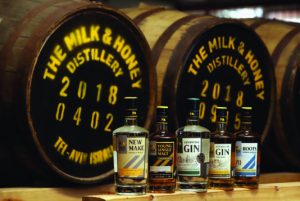The last few years have seen major attitude shift towards kosher wine, as drinkers used to the sweet kiddush variety have been exposed to the influx of quality produce hailing from the Americas, New Zealand, Argentina and Europe, much of which is being increasingly stocked by the big supermarket chains.
The main reason for kosher wine’s poor reputation has undoubtedly been down to the pasteurisation process, rendering it mevushal, literally translated as ‘cooked’, which allows it to be served by non-Jews, who may otherwise (the thinking goes) be tempted to offer your nice glass of merlot to false idols behind your back.
As with anything, boiling wine kills the subtle flavours – however technological innovations over the last few years, namely a new process called ‘flash détente’ rapidly heats and cools harvested grapes, ensuring they retain their flavour while ensuring that they are kosher drinks.
Israeli winemaking dates back over 5,000 years, (long before the Romans were crushing grapes) yet it’s only over the last decade the nation has gained international renown as a major winemaking region. The best of its offering hails from Bordeaux-style grape varieties which thrive in the higher altitudes of the mountainous terroir of the Galilee and Golan Heights.
A fine example of the nation’s most-cultivated grape, Dalton, Galilee’s first commercial winery, boasts an impressive reserve cabernet Sauvignon, matured in oak barrels for 18 months to cultivate a complex character of black plums, eucalyptus and chocolate.
Bucking the country’s red wine dominance, Golan Heights Winery produces one of the best traditional-method chardonnays in Yarden Blanc de Blanc 2011. Vines grown from the region’s volcanic soil at 3,000 ft above sea level preserve acidity, delivering crisp citrus flavours with hints of apple.
Making a Fizz
It wouldn’t be a party feature without some celebratory sparkle. Laurent-Perrier is one of a number of champagne houses that has recently invested in a kosher reserve. Laurent Perrier Kosher Brut NV tends to cost a tenner more than the ordinary Laurent-Perrier, but complies with strict Jewish dietary guidelines from harvest to bottling. Crisp with hints of citrus, it stands up to a variety of fish dishes such a halibut or turbot, and is a great match for your hors d’oeuvres.
Champagne Barons de Rothschild has recently released a kosher rosé prestige cuvée to add to its five-strong champagne range. The prestige rosé will join the brut, extra brut, blanc de blancs, rosé and blanc de blancs prestige cuvée 2008 in the ever-growing kosher collection. Made from grapes comprising 85% chardonnay and 15% pinot noir, this deep gold coloured tipple has a fresh, assertive character with sweet raspberry undertones.
Whisky Business
A growing number of Scotland’s most prolific distilleries, Glenmorangie, Ardbeg and Glen Garioch to name but a few, are investing in the supervisory services of Orthodox Union rabbis to certify that their raw ingredients, distilling and bottling are conforming to kashrut.

Despite the whisky process itself being kosher, most port, sherry and wine are not kosher drinks, meaning that whisky aged in such a barrel no longer retains its kosher designation. The custom of maturing scotch whisky in used barrels is down to the belief that new wood may overpower the delicate flavours. However, one of Scotland’s oldest distillers, Glen Garioch has just produced a new kosher drink variety, Glen Garioch Virgin Oak, aged entirely in fresh North American white oak. The distillers behind the experiment appear to have bucked conventional wisdom – creating a well-received dram, rich with notes of treacle, chocolate and orange.
In Israel, whisky has become so popular that single malt distilleries including Edre’i, Golan Heights, Jerusalem Distilling Company, Pelter and Legends, have been cropping up across the country. The pioneer of this recent revolution, Milk and Honey Distillery, established in 2012 in the south of Tel Aviv, produces a kosher “Speyside/Highland inspired single malt using waters from the Holy Land” originally created under the watchful eye of the late Scottish master distiller, Jim Swan.
Proving an unlikely hotspot for the tipple, the heat and humidity work to accelerate the maturation process, imbuing the whisky with a character and depth beyond its years. The only downside is the whopping 10% ‘angel share’ lost to the blistering heat over the customary three-year maturation period, leading the distillery to produce a number of ‘young malts’ – not old enough to be labelled whisky.
However, its Triple Cask Young Single Malt still proves a fine example of its radical experimentation, having been matured in red wine, bourbon and notoriously smoky Islay casks, to give it an impressively complex flavour, layered with fruit and spice.

